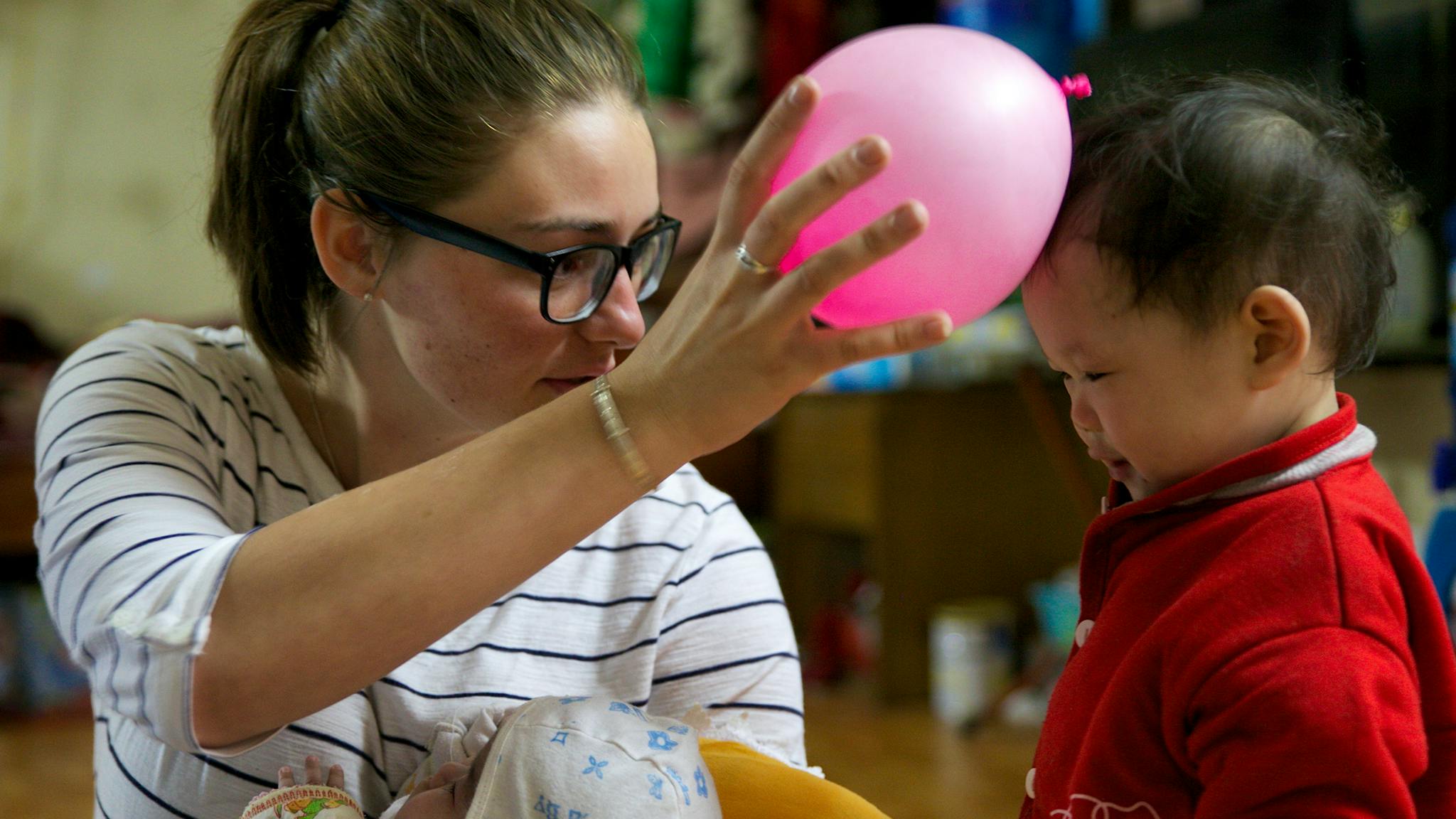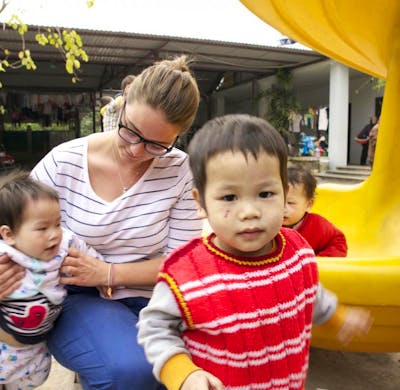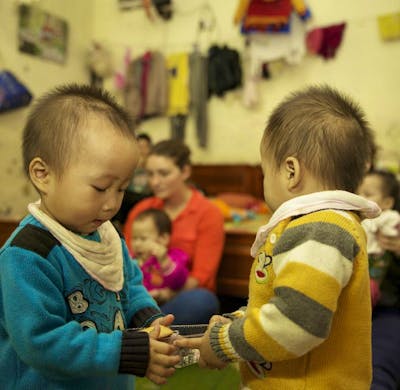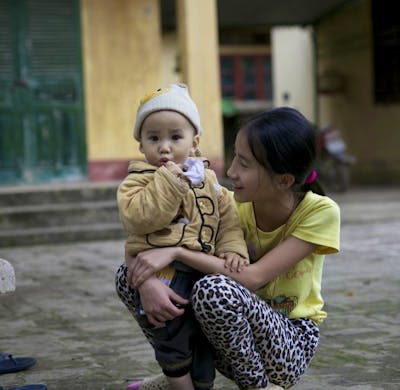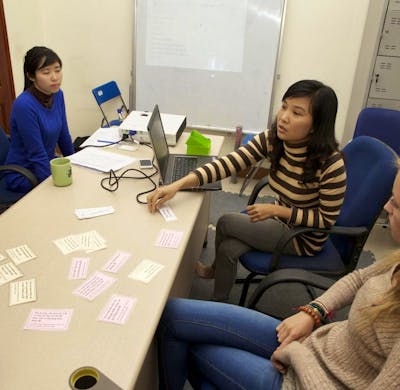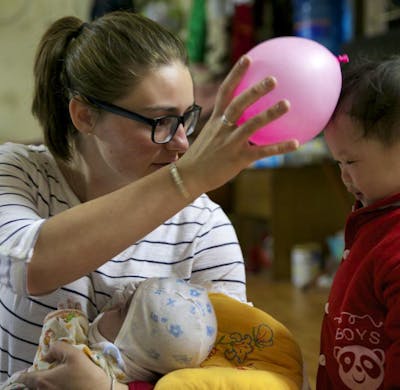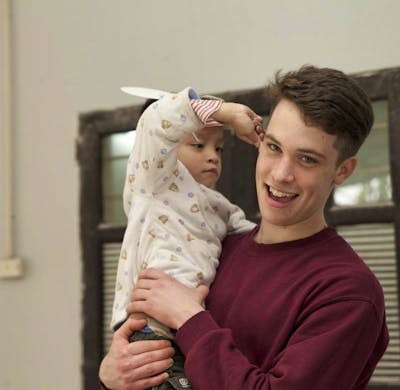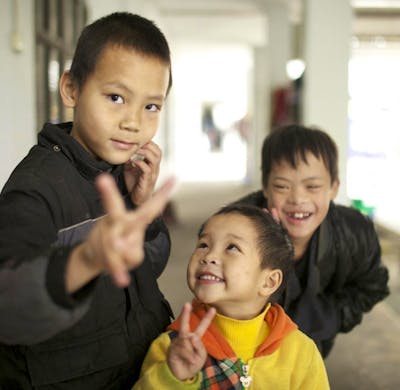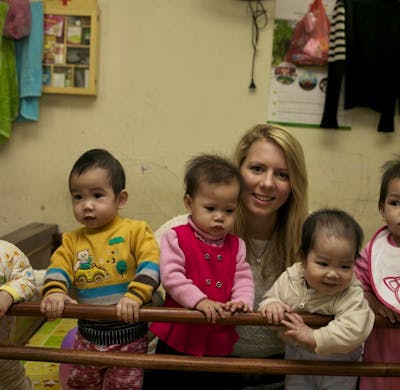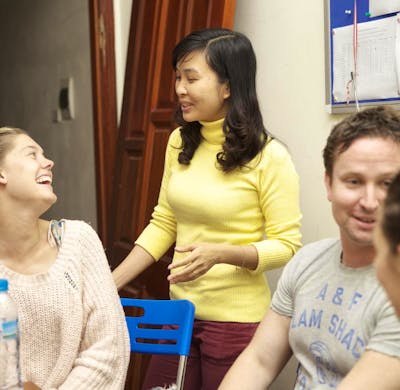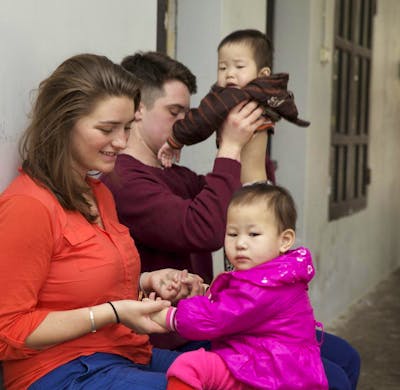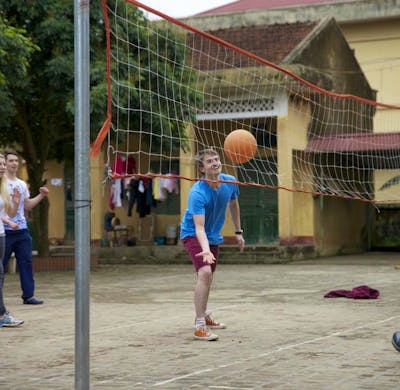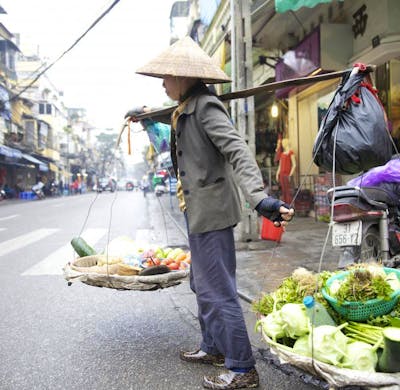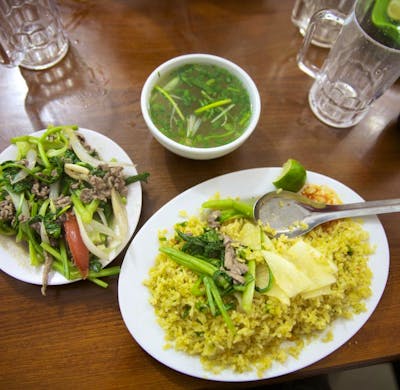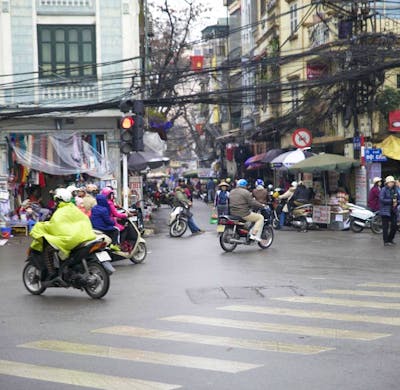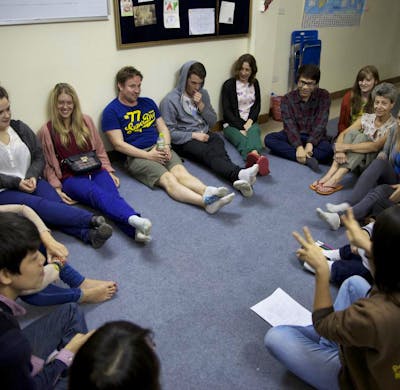As a childcare volunteer in Vietnam with PMGY, you will work to brighten up the lives of young children, making an important contribution to their daily lives. Our local team and volunteers work with a range of organisations in and around Hanoi. Our international volunteers provide vital support and care for children and young adults in care centres and kindergartens.
BACKGROUND TO THE CHILDCARE PROGRAM
As a participant on the childcare volunteer abroad project in Vietnam, you will be involved in one of two project types during your time. Our volunteers support a range of facilities in and around Hanoi. Not only do participants work with childcare centres, but also facilities caring for young adults and children with disabilities.
As in most developing countries, disabled people in Vietnam do not receive the level of support they need. It is estimated that nearly seven million people in Vietnam are disabled (8% of the population). We support projects in Hanoi that provides vital assistance to these vulnerable groups. Volunteers on one of these programs work with local staff to complement their work and enhance the opportunities of both children and young adults that they help care for.
Volunteering with disabled people is a challenging but highly rewarding experience. These projects require you to use your creativity, emotional strength and resourcefulness to make a difference. Through your hard work, you will not only change their lives but yours as well. Although challenging, the project offers volunteers the opportunity to showcase their skills in supporting others.
In the childcare centres we also support, the aim of a volunteer work in Vietnam is to provide daily support in caring for children. In addition, Vietnam childcare volunteers will work to nurture their English, confidence and communication skills. Roles may vary from teaching basic English to leading fun activities, and assisting with tasks such as mealtimes.
CHILDCARE VOLUNTEER PLACEMENT EXAMPLES
Friendship Village - This is a living, health, and educational centre for children and adults living with the effects of Agent Orange. The centre also provides healthcare to war veterans. Friendship Village was founded in 1992 by George Mizo. The American veteran wanted to help repair the damage caused by Agent Orange in the America-Vietnam War. The Friendship Village complex is primarily composed of: two living quarters, two classroom buildings and a health centre. There is also a vegetable garden, as much of the food is grown on-site.
The centre provides a home to 120 residents, aged from 4-40 years of age. The residents come from all over Vietnam and suffer from a range of disabilities. This can include Autism, Cerebral Palsy, Down Syndrome, physical deformity, and severe mental disability.
Volunteers help out in a number of different ways. This can include collaborating with the teaching staff as to new ideas and techniques to help the residents. You can share ideas on how to structure lessons, provide an independent evaluation of the students, and work on updating profiles. Sometimes volunteers will also teach English to the staff, teachers and residents.
Khanh Tam Day Care Centre - This project was established in 2006 for early detection and care of mentally impaired children. The centre cares for approximately 80-90 children, aged 1-12. Here, there are a total of 4 classes:
• Early Intervention - The target group is aged between 2-5 years. The program provides children with basic skills to develop (communication skills, playing with others and etc). Namely, this aims to help children integrate into society at an early age (kindergarten age).
• Primary/Elementary Program - The target group is aged between 6-12 years. The children in this class will learn how to read, write and calculate.
• School Function Program - The target group is aged between 6-12 years, with no ability to study standard primary school program.
• Living Skills Program - The target group is individuals between 10-16 years. These students have no ability to integrate into society or study a standard primary school program. Children will focus on learning living skills to help them prepare for when they grow up.
Volunteers will initially begin the project with an observational role. This will become more hands-on after generating a better understanding of the project and the individual abilities of the students. Vietnam childcare volunteers will start to provide a helping hand to run the class activities and lessons. In time, volunteers are encouraged to come up with and run their own ideas, bringing in new perspectives to the centre.
Please note that the minimum time commitment to join Khanh Tam Day Centre is 4 weeks.
Morning Star Centre (Sao Mai) - Founded in 1995, Morning Star centre is a subsidiary of the Vietnam Relief Association for Children with Disabilities. The centre has nearly 70 staff members caring for approximately 150 children ranging in age from 1-25 years. Morning Star’s mission is to provide opportunities for children and young adults with special needs. Local staff and volunteers work to ensure that individuals receive education and training. This aims to help them successfully play their part in the local community. The centre strives to provide assistance for those children suffering from developmental disabilities including Down’s Syndrome, Autism and Cerebral Palsy.
The children are grouped in smaller classes of around 12-13 children. On average, there are 2-3 teachers per class. The classes are tailored to the needs of the children. Volunteers can get involved in a range of activities from basic education, motor skill development, play therapy and physical education sessions.
Where possible, Morning Star strives to prepare the children to enter mainstream education. However, it is quite common for former pupils who have entered mainstream education to return to Morning Star. This is unfortunate because government schools are by no means equipped to welcome special needs students.
In addition to their traditional classes, each pupil will also participate in one-on-one occupational and/or speech therapy classes. Volunteers with relevant experience may have the opportunity to sit on in these sessions to provide further guidance to staff members. However, participants with the appropriate experience will not be able to run these sessions independently.
Morning Star offers some vocational and pre-vocational courses for teenagers before sending them to outside vocational schools. The courses help increase the student’s independence and confidence, and their abilities to get enrolled in professional training centres outside. Having recently set up a coffee shop within the centre, some of the students help out here. Through this scheme, the students receive valuable experience in working and interacting with the public. Many students have also been participating in cooking lessons, with the eventual to sell these masterpieces within the shop.
Chich Bong Kindergarten - This centre is home to children aged from 12 months to 6 years old. The kindergarten’s mission is to explore and develop children’s abilities. This is done through teaching art subjects, languages and various methods of communication. It also has different clubs in the school where the kids can nurture their talents and cater to their hobbies.
Generally, one class will hold 15-20 kids. The volunteers are expected to help the children improve their English through songs, dance and informal education. They should be creative in generating fun basic educational materials. Doing this allows the children to become more confident in their communication and mannerisms. This may include arranging drawing, painting and handicraft activities. There will also be a local teacher in the class to help the volunteers if needed.
Rose Kindergarten - Home to children from 2-6 years old, this project aims to support children with their early years development. The project is located in the Bac Tu Liem district of Hanoi. At the kindergarten, volunteers support local staff with art, dance, sports and music classes. For the children who are a little older, participants can focus on creating educational materials with the children and help with basic reading and writing activities. In turn, helping the children become more confident in communicating in English.
The project is usually split into two. For example, a big class for children from 2-3 years old and a smaller class for those over 3 years of age. For the younger children, volunteers will help with feeding time, organising games and arts and crafts activities when needed. There are extracurricular activities that volunteers can support local staff with to enhance their relationship with the children and develop a better understanding.
There are 2 local teachers in each class to help the volunteers manage the classroom environment. However, the local staff do not speak great English. Therefore, the local team will ensure a translator is on-site working closely with the volunteers to help with translation and limit any language barriers.
OTHER THINGS TO CONSIDER WORKING WITH CHILDREN IN VIETNAM
Return Airport Transfer - Your return airport transfer is not included in your Program Fee. Our local team can help arrange onward transfers to the airport or an alternative destination from the volunteer accommodation. Making specific arrangements once in Vietnam provides more flexibility as plans can often change and participants may be on similar flight plans. Alternatively, a more common and cheaper method is to use a ridesharing app. Participants can often be travelling across their final few days and therefore are not necessarily heading back to the airport directly from our accommodation. The costs depend on your method of transport and your final destination. This can often be split across multiple participants if you are travelling with someone else on the program.
Resources - On the childcare project in Vietnam, resources can be very limited. Volunteers are recommended to bring materials to the project each day to maximise their productivity and day to day involvement. It is therefore important for volunteers to prepare well in advance to get the most out of their childcare volunteering experience in Vietnam. Some projects (such as Khanh Tam and Morning Star) can have a good amount of resources, but be lacking in human resources which is where the volunteer support is invaluable.
Project Availability - A childcare volunteer in Vietnam is advised to note that we support a range of childcare projects in and around Hanoi. This is in addition to the examples provided across this overview. Thus volunteers may be located at such placements not listed in the overview. This can be particularly true for our volunteer projects across the summertime, where we have higher numbers of volunteers. With great volunteer numbers, we are able to further our contribution to the community and also prevent overcrowding at current establishments. This is also in line with school holiday periods in Vietnam. During this period, there is more need and availability for community programs and summer classes through the day.
Please note that although we do our best to place volunteers at their chosen project, this is not always possible. This can be requested under the ‘Special Requirements’ section of your application. Vietnam childcare volunteers should expect to be placed at either a childcare centre or facility for individuals with special needs. Participants must note that it is possible that participants may work with young adults and/or children.
Placement Settings - PMGY does not provide volunteer opportunities in orphanages in any of our locations. Research and studies have shown that visiting and volunteering in orphanages has the potential to generate an industry that separates children from their families. In turn, putting children at increased risk of neglect and abuse. Therefore, we do not support these institutions with our volunteer network.
Instead, we focus on offering alternative childcare volunteer opportunities whereby children come to and from the placement setting each day. In other words, our local teams collaborate with childcare projects which do not offer any form of residential care. These are safe, responsible, and vetted projects, where participants continue to provide valued assistance supporting local staff.
Weekends - Your project work in Vietnam runs from Monday-Thursday and weekends are free (Friday-Sunday). You are welcome to relax and hang out at the volunteer accommodation, but most participants will use this time to travel and explore the country. As a result, you can check out our Vietnam Weekend Travel Guide for top tips on how to spend your weekend. For those who wish to stay in Hanoi on Friday, you are encouraged to continue your participation in the project as usual.
 ·
·
Verificado por Volunteer World
·
·
·
Verificado por Volunteer World
·

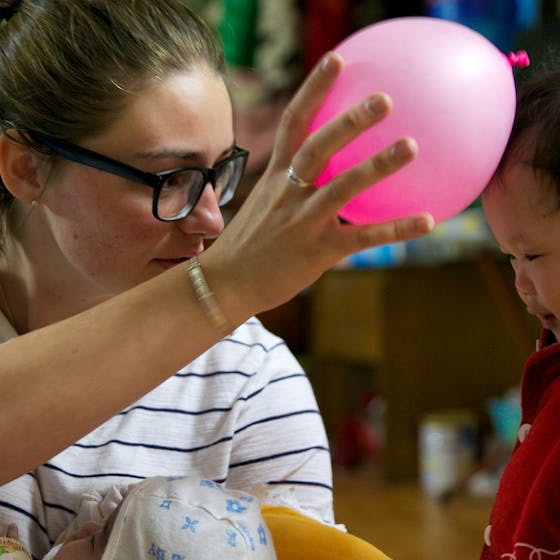
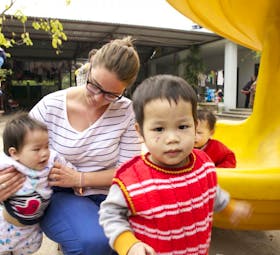
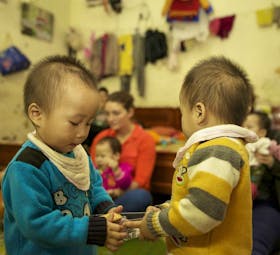
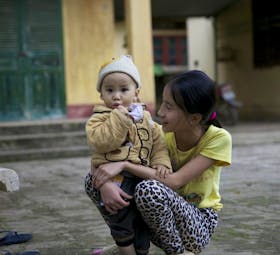
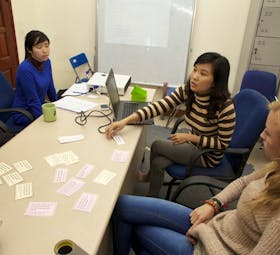

 (1434 revisões)
(1434 revisões)
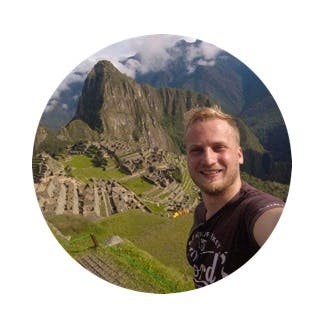
 4.9
4.9

